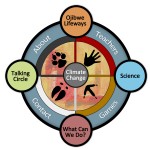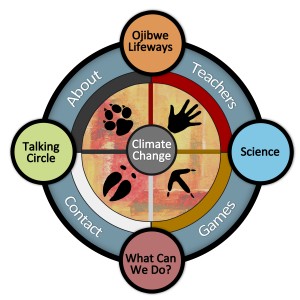 “Gikinoo’wizhiwe Onji Waaban” (“Guiding for Tomorrow” in the Ojibwe language) or
“Gikinoo’wizhiwe Onji Waaban” (“Guiding for Tomorrow” in the Ojibwe language) or
“G-WOW”
“When I saw that we would be teaching about climate change…, I thought Ugghhh!!! Now I see that the cultural impact of climate change is how to approach middle school kids with this topic.“-Teacher participating in a G-WOW professional development institute
“G-WOW” is a model for developing climate literacy, teaching, and communicating to build climate change awareness and action in youth to adult learners. G-WOW investigates climate change through its impact on cultural and economic practices we value based on how it is affecting the sustainability of beings (species) and habitat conditions that support those activities. The model integrates scientific ecological knowledge and “place-based” climate evidence we can observe, with traditional ecological knowledge (TEK) of the Lake Superior Ojibwe people whose culture has a long relationship with the environment. G-WOW promotes community level action to increase resiliency to a changing climate and reduce its impacts, no matter your location or culture.
G-WOW Climate Change Curriculum www.g-wow.org
Four seasonal curriculum units, with a unit on climate change and water, engage middle school to adult learners in integrating Ojibwe traditional ecological knowledge (TEK) and place-based investigations with scientific ecological knowledge to evaluate how climate change is affecting all of us. The G-WOW curriculum guides learners to investigate climate change within their own culture, take action, and share the results with others.
The G-WOW website features lesson plans, activity guides, climate change resources, program data bases, visual resources, games, and more. Ojibwe culture and language are infused into the curriculum.
Does the G-WOW model work to increase climate awareness and action? The G-WOW model has proven effective in increasing skills and confidence in teaching about climate change across different communities and cultures. Click here for research by Patty Carpenter-University of Minnesota-Duluth Master of Education candidate documenting the effectiveness of the G-WOW model in building climate change teaching confidence and effectiveness, no matter the culture or location.
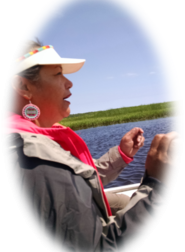 Climate Strong” Climate Leadership Programs
Climate Strong” Climate Leadership Programs
The Climate Strong! initiative uses the G-WOW climate literacy framework for the professional development training institutes, youth training opportunities, and climate change community events. Jump over to the Climate Strong! webpage for more details.
Climate “Camps” and School Programs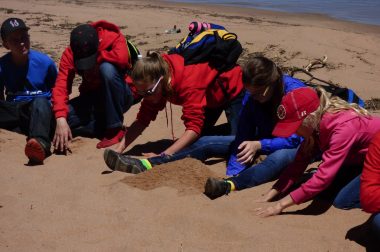
Create a customized climate change learning experience for middle school and above students based on the G-WOW approach. Programs range from indoor experiences at the Northern Great Lakes Visitor Center in Ashland, WI to “hands on” outdoor field activities at the Center, on the Apostle Islands, within the Bad River Watershed, and area Tribal communities. Partial day to multiple day programs can be arranged with advanced reservations. Contact Cathy Techtmann, cathy.techtmann@wisc.edu for reservations.
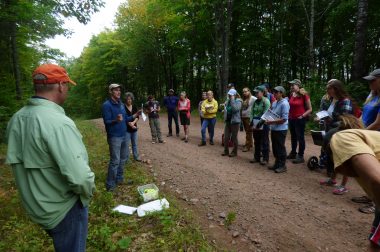 Climate Change Professional Development Training & Field Courses
Climate Change Professional Development Training & Field Courses
Professional development and customized field courses for college level to adult participants increase awareness and climate leadership in college level to adult participants based on the G-WOW model.
Check out our Ecology and Culture Field Courses to get an idea of customized type of learning experiences we can offer. Professional development presentations on climate change can also be arranged for workshops and conferences upon request. Contact cathy.techtmann@wisc.edu for more information.
Archive of G-WOW Changing Climate, Changing Culture Institutes
Browse the 2012-2016 G-WOW Archives to see what we learned at past G-WOW Changing Climate, Changing Culture Institutes.
In 2019 our G-WOW institutes expanded into the new Climate Strong! Leadership Initiative.
*****************************
Kudos for G-WOW
2019: G-WOW Climate Literacy Initiative was presented at the International Symposium for Society and Natural Resources, the Climate Generation Science Standards Workshop, Wisconsin Lakes Conference, NW Wisconsin Lakes Conference, UW-Stevens Point natural resources courses.,
2018: G-WOW Climate Literacy Initiative presented at the 5th Annual Rising Voices Indigenous Climate Conference, Wisconsin Science Festival, UW-Madison Life Sciences class, North Central Tribal Water Summit, and the New York Academy of Science’s “Science Denial” conference.
2017: G-WOW Climate Literacy Initiative presented at Wisconsin Science Festival, Minnesota Outdoor Educators Conference, Will Steger Summer Climate Institute, Nicolet College’s “critical conversations” adult learning program
2015: The G-WOW Climate Literacy Initiative was featured in the North American Lake Management’s LakeLines magazine.
2015: G-WOW presentation was featured at the Rising Voices Conferences “Bringing Together Science and Indigenous Ways of Knowing to Create Positive Solutions”.
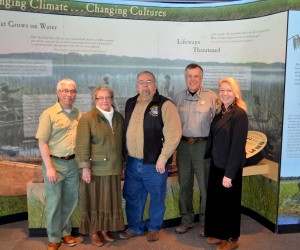 The G-WOW Project received the prestigious 2012-13 Honor Award from the Eastern Region of the US Forest Service in the category of “Courageous Conservation.” G-WOW Team members receiving the award (left to right) are Jason Maloney-US Forest Service, Sue Erickson and Jim St. Arnold-Great Lakes Indian Fish and Wildlife Commission, Neil Howk-Apostle Islands National Lakeshore, and Cathy Techtmann-UW Extension.
The G-WOW Project received the prestigious 2012-13 Honor Award from the Eastern Region of the US Forest Service in the category of “Courageous Conservation.” G-WOW Team members receiving the award (left to right) are Jason Maloney-US Forest Service, Sue Erickson and Jim St. Arnold-Great Lakes Indian Fish and Wildlife Commission, Neil Howk-Apostle Islands National Lakeshore, and Cathy Techtmann-UW Extension.
For more information about the G-WOW Changing Climate, Changing Culture Initiative or assistance in adapting the model in your community, please contact Cathy Techtmann-Environmental Outreach State Specialist at cathy.techtmann@wisc.edu
The G-WOW Initiative is a collaboration between the University of Wisconsin-Extension, the Great Lakes Indian Fish and Wildlife Commission (GLIFWC), Chequamegon-Nicolet National Forest-US Forest Service, and Apostle Islands National Lakeshore-National Park Service
With funding through the WI Coastal Management Program, NOAA, the Great Lakes Restoration Initiative, NASA, and the National Parks Foundation. With assistance from the Bad River Band of the Lake Superior Ojibwe, the Wisconsin Initiative on Climate Change Impacts, the Great Lakes Restoration Initiative, the Northern Institute of Applied Climate Science-USDA Forest Service, and many others!
